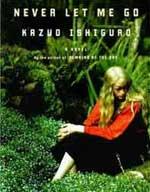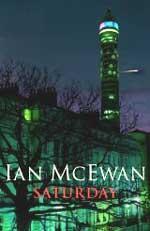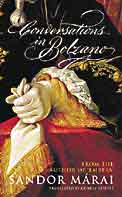|
|
| Help | |
| You are here: Rediff Home » India » Get Ahead » Leisure » Books |
|
| |||||||||||||||||||||||
|
| |||||||||||||||||||||||
 e may have to wait till July for the next Harry Potter [Images]. Or, if you prefer higher literary fare, till September for Salman Rushdie's [Images] Shalimar The Clown.
e may have to wait till July for the next Harry Potter [Images]. Or, if you prefer higher literary fare, till September for Salman Rushdie's [Images] Shalimar The Clown.
But as the first section of this summer reading round-up should demonstrate, there's more than enough for armchair enthusiasts.
 Never Let Me Go
Never Let Me Go
Kazuo Ishiguro
Science fiction might be less than overwhelmed by the premise of the plot, considering Larry Niven, William Gibson and our very own Manjula Padmanabhan have all dealt with the implications of clones and organ harvesting.
But only Ishiguro could take a classic SF premise, transfer it to the environs of an English country house and delve deeply into the internal, psychological life of clones.
And few writers today have his talent for creating truly haunting, unforgettable fictional moments.
The oddest piece of Ishiguro trivia I ever discovered had to do with his 'author trading card', like baseball trading cards, where he is apparently doing as well as Marianne Faithful and better than Rick Moody.
 Saturday
Saturday
Ian McEwan
The most famous examples of life-in-the-day novels are probably James Joyce's Ulysses and Virginia Woolf's Mrs Dalloway, so the bar's already set way high.
Not that McEwan was daunted.
The usual adjectives employed to describe a McEwan novel are 'dark' and 'menacing', often used in conjunction with lighter terms: 'darkly lyrical', 'menacing but illuminating'.
Feel free to mix and match. McEwan's neurosurgeon protagonist has the perfect life until he bumps into a violent, inarticulate thug on his way to a squash lesson.
This random encounter brings darkness into his house the same evening. McEwan pits peace rallies against 9/11 and Iraq, poetry against knuckle dusters, to mixed effect.
Saturday resembles J M Coetzee's Elizabeth Costello in its preoccupation with polemics and digressive arguments, but is faster paced and more coherent in its plot.
Definitely a Booker shortlist contender, despite the reviewer who was so less than gruntled by Saturday that she echoed Dorothy Parker's sentiments about certain books not to be put down lightly, but to be thrown with great force. Conversations In Bolzano
Conversations In Bolzano
Sandor Marai
Sandor Marai used to be Hungary's best kept secret, like ghoulash, but more palatable.
Born in 1900, he survived World War II, but had to flee the country -- first to Italy [Images] and then the United States, where he committed suicide in 1989.
The first of his books to be translated was Embers, where two men talked at interminable, but very lyrical length over the course of a night about such matters as friendship, rivalry and masculine pride.
For Conversations In Bolzano, Marai chose Casanova as his protagonist, facing off with the Duke of Parma for the love of a woman. All three talk over several nights about matters like passion and the death of love.
You know what to expect. The story is dated since 1940. But Marai takes you back to a time when long interrogations into the meaning of life were still the stuff of great, spellbinding literature.
 The Shadow Of The Wind
The Shadow Of The Wind
Carlos Ruiz Zafon
A long-forgotten book by a long-forgotten author is rediscovered by a young boy growing into manhood in Barcelona. But someone wants the author's name, reputation and books to disappear into oblivion.
Zafon came up with a brilliant idea in the form of the 'cemetery of forgotten books', a place where every book has at least a chance of discovering a reader.
As to the rest, he introduces skullduggery, romance, and twists in the tale every few pages to form a baroque, bizarre romance.
The author is a screenwriter based in Los Angeles and drew some complaints from residents of Barcelona who griped that it's always raining or cold in the city as depicted in his book.
Still, a great read, especially for bibliophiles. The Alchemy Of Desire
The Alchemy Of Desire
Tarun Tejpal
Rarely has a simple blurb caused so much heartburning in Delhi's [Images] literary circles.
But then this one: 'At last -- a new and brilliantly original novel from India,' was handed out by V S Naipaul, known to bury debut authors rather than praise them.
Tejpal accompanied him to Stockholm when the Great Curmudgeon won his Nobel, though, and the friendship between them is long standing.
The book is about a young couple's odyssey into desire and marriage, with the point of fading lust marked by the narrator's growing obsession with a ghost from the past, in a very literal sense.
I normally resist coupling book titles, but not very hard. Think Love Story meets Plain Tales From The Hills.
 The Road To Raisina
The Road To Raisina
K P Singh
This is a light, but thoroughly enjoyable, read for denizens of Lutyen's Delhi.
Singh's formula is pure Jeffrey Archer with a dollop of desi ghee: take three schoolmates, throw
them into the maelstrom of Indian politics and have them fight it out for the PM's chair.
The plot has a few loose ends and holes, but these will be papered over by the dry sound of bureaucrats and ministers chuckling.
Girl Alone
Rupa Gulab
This book is a reasonably entertaining and astute entry into the Indian chicklit world.
Rupa Gulab's heroine is a cough syrup addict who can't quite find her man.
She is also the face of the new single Indian woman, to put it in tabloid terms.
Gulab's style is brisk, pretty funny, and not unlike what's been coming up on blogs like Bridal Beer of late.
Powered by
|
|
| © 2008 Rediff.com India Limited. All Rights Reserved. Disclaimer | Feedback |